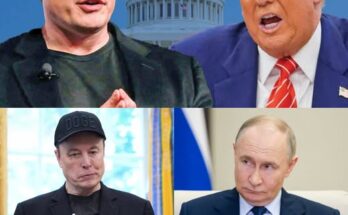Elon Musk, the billionaire entrepreneur and CEO of Tesla and SpaceX, is no stranger to making controversial statements on social media. His most recent remarks about US-funded broadcasters Radio Free Europe/Radio Liberty (RFE/RL) and Voice of America (VOA) have stirred significant debate about the role of government-funded media, the influence of corporate power on free speech, and the changing dynamics of global information dissemination. In early February 2025, Musk called for the shutdown of these two broadcasters, which are funded by the US government through the US Agency for Global Media (USAGM). His comments came in response to a post by Richard Grenell, a former US ambassador, who criticized the broadcasters for being politically biased, particularly in their reporting on conservative political movements. Musk’s statement that “Nobody listens to them anymore. It’s just radical left crazy people talking to themselves while torching $1B/year of US taxpayer money” has sparked reactions from supporters, critics, and international media observers al.
In this article, we will explore the history of Radio Free Europe and Voice of America, the motivations behind Musk’s call for their closure, the impact of such a shutdown on global media and democracy, and the broader implications of Musk’s stance within the current geopolitical and political climate.
The Role of RFE/RL
Both Radio Free Europe/Radio Liberty (RFE/RL) and Voice of America (VOA) have deep roots in US foreign policy and the spread of democratic values through global media. Established during the Cold War, these broadcasters were created as part of an effort by the US government to counter the spread of communist propaganda, particularly by the Soviet Union, and to provide an independent and alternative voice to state-controlled media in authoritarian
Voice of America (VOA) w
Radio Free Europe/Radio Liberty (RFE/RL), founded
Both VOA and RFE/RL are funded by the US government, but they operate with editorial independence. The goal of these broadcasters is to offer unbiased, accurate, and timely news to regions where the press is either controlled by the state or where media censorship is common. Despite their government funding, they are meant to function as independent, objective news sources, providing a counter-narrative to state-run
Mu
In ear
Musk’s response was blunt: “Yes, shut them down. Europe is free now (not counting stifling bureaucracy). Nobody listens to them anymore. It’s just radical left crazy people talking to themselves while torching $1B/year of US taxpayer money.” Musk’s comment points to several concerns: the political bias of these outlets, their perceived lack of relevance in a more interconnected world, and the cost of government funding. Musk’s position reflects a broader ideological shift that questions the role of government in funding media organizations, particularly those with a perceived political leaning.
Musk’s remarks come at a time of increasing political polarization in the United States, where many conservative figures have expressed concerns about the media’s bias. There is growing criticism from the right that mainstream media, including government-funded outlets like VOA and RFE/RL, often reflect a liberal agenda that is out of touch with the political values of many Americans. Musk, who has been a critic of liberal political movements, seems vocal to view these broadcasters as another example of government entities pushing a specific ideological agenda.
The Role of Government-Funded Media in Global Journalism
Musk’s call for the shutdown of RFE/RL and VOA raises several important questions about the role of government-funded media in today’s global media ecosystem. In democratic societies, media organizations that are funded by the government are often subject to scrutiny due to concerns over impartiality and the potential for political influence. However, in the case of VOA and RFE/RL, these broadcasters have been instrumental in providing independent, uncensored news to audiences in regions where press freedom is limited.
The shutdown of these broadcasters would have far-reaching consequences, particularly for audiences in authoritarian regimes where independent media is either censored or outright banned. In countries like Russia, China, Iran, and North Korea, where the government controls most, if not all, of the media landscape, outlets like VOA and RFE/RL provide a critical alternative source of news and information. These broadcasters offer stories that are not influenced by the state, covering issues such as human rights abuses, government corruption, and the suppression of free speech—issues that are often ignored or censored in state-run media.
In addition, the shutdown of RFE/RL and VOA would send a signal to the international community that the US is retreating from its role as a champion of free speech and democracy. These broadcasters serve as an extension of US foreign policy, promoting democratic ideals and countering authoritarian propaganda. The loss of these platforms could weaken the US’s ability to influence global media narratives and diminish its standing as a defender of press freedom.
The Impact of Shutting Down RFE/RL and VOA on Global Information Flow
If Musk’s call for the closure of RFE/RL and VOA were to be realized, it would have profound consequences for the global information landscape. As mentioned earlier, RFE/RL and VOA play a critical role in regions where access to independent media is scarce. These broadcasters provide a rare window into the outside world for millions of people who live under repressive regimes. Without them, many individuals would be left with no reliable sources of information other than state-controlled outlets, which often distort the truth to suit the interests of the ruling government.
Moreover, RFE/RL and VOA’s role in countering misinformation and disinformation would be significantly diminished. In an era where social media platforms, such as Facebook and Twitter (now Their shutdown would contribute to the erosion of the global information ecosystem, making it even more difficult for people to access factual news.
The Political and Geopolitical Implications
The political and geopolitical ramifications of Musk’s proposal are equally significant. By calling for the shutdown of these broadcasters, Musk is effectively advocating for a reduction in the US’s role in promoting global democracy through media. This stance aligns with a broader trend of isolationism and skepticism of international involvement that has become more prominent in American political discourse. Musk’s comments reflect a growing desire to reduce government spending on foreign media outreach, especially when it comes to programs that are perceived as politically biased or outdated.
On the international stage, the closure of VOA and RFE/RL would likely be seen as a victory for authoritarian regimes that rely on state-controlled media to maintain their grip on power. Countries like Russia, China, and Iran have long criticized US-funded broadcasters, viewing them as vehicles for Western propaganda. Musk’s proposal could embolden these regimes, giving them ammunition to further restrict access to independent media within their borders.
Public Reactions to Musk’s Proposal
Musk’s remarks have provoked mixed reactions from various segments of the public and political sphere. On one hand, there are those who support his stance, particularly within conservative circles, who argue that US taxpayer money should not be used to fund what they perceive as liberal-leaning media organizations. They see Musk’s proposal as a necessary step in reducing government waste and aligning US media operations with modern political realities.
On the other hand, many critics view Musk’s comments as short-sighted and dangerous. Media advocates, journalists, and policymakers argue that the closure of RFE/RL and VOA would undermine the United States’ global influence and further undermine press freedom worldwide. These critics point out that, despite the challenges of operating in a politically charged environment, these broadcasters continue to serve a vital role in providing independent and fact-based journalism in regions where such journalism is often suppressed.
Conclusion
Elon Musk’s call for the shutdown of Radio Free Europe/Radio Liberty and Voice of America has ignited a critical debate on the role of government-funded media, the influence of political bias in journalism, and the future of free speech globally. While Musk’s proposal reflects a growing skepticism about the effectiveness of US government-funded media, particularly in an era of digital and social media, it also raises important questions about the long-term consequences of cutting back on these broadcasters’ operations. RFE/RL and VOA play a crucial role in promoting democracy, countering authoritarian propaganda, and providing independent journalism in regions where press freedom is under threat. The shutdown of these organizations would have significant implications for global information flows, US foreign policy, and the future of free expression.
4o mini


